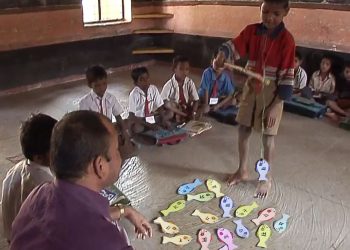Foundational Literacy and Numeracy (FLN)
The Context
The NEP 2020 squarely addresses this problem and sets forth an Action Plan to solve it. While these guidelines are for the most part theoretically sound, bringing them into practice requires a large-scale effort on the part of teacher educators, teachers, and the administrative machinery. Programmes for achieving good learning outcomes in literacy and numeracy need a major reorientation of the entire pedagogy of early literacy and mathematics, a revamping of evaluation systems, and attention to enhancing the motivation of teachers.
It is here that CLR can contribute, through technical support to government systems, rooted in knowledge gained from our continuous engagement with national and global research, as well as actual experience in the field for almost 4 decades.
We partner with state and district-level government agencies and like-minded NGOs and institutions, to provide technical support of high quality towards teacher capacity building and locally relevant teaching-learning materials
What CLR Offers
- Ongoing professional development of teacher trainers, resource persons, teachers and NGO support teachers, integrating a theoretical understanding of FLN with practical skills and approaches to teaching, reviewing and assessing learner progress, within the framework of state curriculum and evaluation policies
- Provision of supporting materials for teachers, like manuals, print modules, assessment cards
- Provision of a School Readiness package to be used in pre-primary schools, or for school entrants in Class 1
- Provision of appropriate and relevant teaching learning materials in language and mathematics, including materials and guidance for creating a supportive school environment for FLN
- Guidance in developing teacher-prepared materials relating to children’s immediate socio-cultural and natural environment
- Training for Mentoring support for teachers
- Monitoring and assessment of processes and outcomes
- Strategies for involvement of parents and local communities through School Management Committees, Panchayats and other local bodies
- Perspective building of administrative cadres towards effective implementation
Recognising and addressing teacher attitudes and perceptions and building understanding and empathy towards the needs of first generation school-goers is part of our approach
EXAMPLES OF CLR PROJECTS AND CAPACITY BUILDING PROGRAMMES FOR FLN

Curriculum Development and Teacher Training for Government Schools in Nandurbar District, Maharashtra
One of the most challenging aspects of working towards improving the quality of education for children from marginalised communities is changing attitudes of teachers and prevailing pedagogy. Usually with high formal qualifications, most teachers have a great deal…

Community-Based Support Classes for Vulnerable School Children in Pune District
Students from educated backgrounds receive a great deal of support from their families, both in terms of a literate environment as well as direct support for homework, preparing for tests and so on. But first-generation school-goers often do not get this support…

Bridging the Gap Between Home and School for Adivasi Children
As more and more children from tribal communities enrol in school, more complex and urgent issues confront teachers. One of the most daunting of these is helping Adivasi children adjust to the completely alien culture of school, which has its own language…
